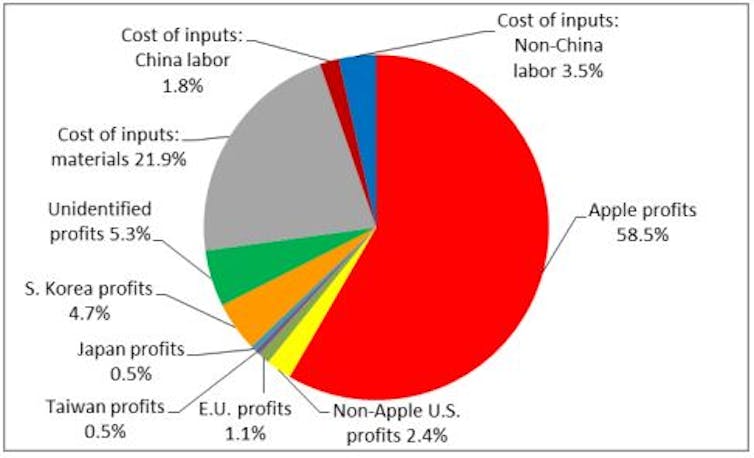
Migration has always been a regular feature of human existence, but these days it is more visible – and politicised – than ever. A 2016 survey found the vast majority of people (80%) would welcome refugees, in agreement with the 1951 UN refugee convention that those fleeing wars or at serious risk of persecution for reasons of race, religion, nationality or political opinion have the right to cross borders and seek asylum.
However, there is much less consensus about those fleeing poverty to seek a better future. We are all familiar with the negative narratives about so-called “economic migrants”, “coming to steal our jobs”, “scrounge off the state”, “overburden the system”, or “undermine our culture and values”.
Even those who oppose such misplaced stereotypes may still be uncomfortable with easing border and visa restrictions because of economic concerns. Migrants who attempt to reach other countries by “illegal” means are also often branded “irresponsible” for embarking on dangerous journeys with vulnerable children.
Hunting the Essex Lorry Killers, a recent BBC documentary, looked at the 2019 case of 39 Vietnamese migrants who were found dead in the back of a refrigerated lorry trailer in Essex. The documentary repeated the popular notion often promoted by politicians that smuggling gangs are responsible for these tragic deaths. And certainly, migration brokers can make a lot of money by supplying illicit transport services in this highly problematic market.
But in another documentary interviewing the families of those victims back in Vietnam, one bereaved father gave a very different perspective. He stated that the reason his son was dead was “because of the currency difference. He went there just for that difference.”
In other words, while smugglers do contribute to undocumented migration, the root cause is actually global inequality. This inequality is reproduced and perpetuated by many multinational companies within a wider economic system that serves to directly benefit the most wealthy and, indirectly, industrialised countries, at the expense of others.
Limited options
As part of my ongoing research, I have interviewed many undocumented Vietnamese migrants who come to the UK to find work and send money back home. Most of them are from rural provinces that have been “left behind” by the rapid development of Vietnam’s major metropolitan hubs.
A common option in Vietnam involves moving to a big city or industrial zone, to work very long, exhausting shifts at a mega-factory assembling electronics for a salary of around £7-£10 per day. This is relatively well paid compared to the average salary for unskilled workers in Vietnam, which is around £110 a month.
But without a decent education or the right personal connections, it’s impossible to move up the social ladder. Interviewees described this situation as a “dead-end” with no hope for a better future for their children in Vietnam.
A report from 2017 found workers at a Samsung factory in Vietnam reported extreme fatigue, fainting, dizziness and even miscarriages due to poor working conditions. Samsung has denied these claims, stating that it “takes great care to provide a workplace environment that assures the highest standards of health, safety and welfare”. Following these allegations and an internal audit, Samsung also adopted a “corrective action plan”.
The bigger picture
Meanwhile, Samsung has made huge profits in Vietnam. This happens all across the world: multinational corporations take advantage of cheap labour in poorer countries through global supply chains. A 2011 study of an iPhone factory in China, for example, found that Apple only paid 1.8% of the finished product value to the factory workers, while the company reaped an enormous 58.5% in profits.
In response to separate allegations raised about working conditions in iPhone factories, Apple said: “We care about every worker in our worldwide supply chain … [and] insist that our suppliers treat workers with dignity and respect.”

Since the late 1970s, the richest 1% have increased their share of global wealth from 23% to a staggering 43% – with the wealthiest four people in the world worth more than the entire country of Vietnam. Multinational corporations represent a continuation of historical exploitation and wealth flow from developing countries to Europe under colonialism, which funded the west’s dramatic rise to prosperity in the first place.
In an unequal world, it makes sense for those in poorer countries with limited options to follow the money to a more developed country, find a low-skilled job, work hard and then send some money back home. This may lead Vietnamese migrants to Japan, Taiwan, South Korea, Germany – or all the way to the UK. Such movement, however, is often forbidden, forcing people to risk potentially deadly border crossings under the radar.
Economic migration as justice?
In our interviews, Vietnamese migrants told me they can earn up to 10 times more by working in a UK nail shop than they could hope to earn back in Vietnam. So it’s not surprising that people would want to try their luck abroad.

In fact, considering the mass exploitation of Vietnamese labour by foreign corporations (which has exacerbated global inequality), it could be argued that economic migration is a matter of justice and that it’s only fair and reasonable that migrants should seek a portion of the extracted labour value that should have stayed in Vietnam.
So if we really want to reduce migration, we must treat it as an inevitable by-product of inequality and address the root causes – instead of simply blaming smugglers or washing our hands of the migrants’ plight.
Seb Rumsby receives funding from the Independent Social Research Foundation.
This article was originally published on The Conversation. Read the original article.







